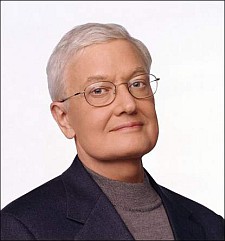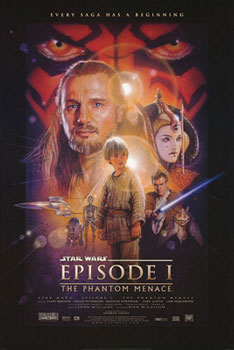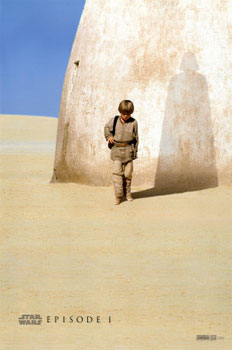“The Devil, Roger Ebert, Made Me do It”
Eric Renderking Fisk - April 14th, 2009
![]()
Roger Ebert has one of the best and the worst jobs in the world. He gets paid to see moves and writes reviews for them! Can you imagine a better gig? Imagine being able to see movies days before anyone else, especially the ones you've been looking forward to.
But then, he has to see all the crap that's the sausage factory known as "Follywood" cranks out. Spending 8 hours a day while cleaning out the vomit, blood and guts, urine and manure in a slaughter house might be better then having to watch dreck like "Smokey And The Bandit 3," " "Summer Of '42," "Howard The Duck," or any of the Police Academy sequels. Even worse, imagine what it would be like to see a coming of age movie with a sub-plot or plot angel that you can't related to.
Before I say anything more...
 ...
Let me say that I like Roger Ebert as a person and I love his
reviews. I don't always agree with him, but I like the way he says
his peace. He's an inspiration for me, and sometimes my writing
style echoes the countless years of reading his. Maybe there would
be no "Flicks To Hold You Over" if it wasn't for "Sneak Previews"
that first aired on PBS or the Syndicated version of "At The
Movies," or his reviews from the Chicago Sun-Times that were
republished in newspapers near me.
...
Let me say that I like Roger Ebert as a person and I love his
reviews. I don't always agree with him, but I like the way he says
his peace. He's an inspiration for me, and sometimes my writing
style echoes the countless years of reading his. Maybe there would
be no "Flicks To Hold You Over" if it wasn't for "Sneak Previews"
that first aired on PBS or the Syndicated version of "At The
Movies," or his reviews from the Chicago Sun-Times that were
republished in newspapers near me.
When I was a very young film addict (as apposed to being "pushing forty" film addict) While doing chores or mowing the neighbors lawn I used to imagine what it would be like to argue with him about the latest films. I would see myself filling in for Gene Siskel (and eventually Richard Roeper.) Mr. Ebert and Mr. Siskel are partly responsible for my passion for classic movies and why I saw Citizen Kane in the first place. I'm enamored with Classic Movie fans, the way they (or we) talk about our favorite films and try to emulate some of their protagonists. Who wouldn't want to be a fedora clad hero while having to make difficult choices and do things people can't or won't do, but should?
Roger Ebert deserves some credit for being one of the people who make writing movie reviews more main stream. He's not a total movie snob, judging by his reviews of The Empire Strikes Back and Raiders of the Lost Ark [Be sure to read his secondary review of Raiders under great movies.] he gets what they're about. He gets the films, and he loves classics just as much as I do, as if that's possible.
With that said, Roger Ebert really stepped into it with his review of "Fanboys." After re-reading his reviews of the movies we all love, I don't understand how he doesn't get this one...
A lot of fans are basically fans of fandom itself. It's all about them. They have mastered the "Star Wars" or "Star Trek" universes or whatever, but their objects of veneration are useful mainly as a backdrop to their own devotion. Anyone who would camp out in a tent on the sidewalk for weeks in order to be first in line for a movie is more into camping on the sidewalk than movies.
Extreme fandom may serve as a security blanket for the socially inept, who use its extreme structure as a substitute for social skills. If you are Luke Skywalker and she is Princess Leia, you already know what to say to each other, which is so much safer than having to ad-lib it. Your fannish obsession is your beard. If you know absolutely all the trivia about your cubbyhole of pop culture, it saves you from having to know anything about anything else. That's why it's excruciatingly boring to talk to such people: They're always asking you questions they know the answer to.
But enough about my opinions; what about "Fanboys"? Its primary flaw is that it's not critical. It is a celebration of an idiotic lifestyle, and I don't think it knows it. If you want to get in a car and drive to California, fine. So do I. So did Jack Kerouac. But if your first stop involves a rumble at a "Star Trek" convention in Iowa, dude, beam your ass down to Route 66.
But wait... there's more!
Roger Ebert: Answer Man: "Fanboys movie is idiotic, but real fanboys not so much." by Roger Ebert
Q. After reading your
"Fanboys" review, I was upset and angry. As a diehard "Star Wars"
"Fanboy" who is far from "socially inept," I must say that if you
think the film is a "celebration of an idiotic lifestyle," then you
should go to a "Star Wars" convention and say that to every single
person there, and let's see what they'll say to you. If you have a
"good reason" for saying what you said, feel free to reply.
Alex
D. Geslin, Greeley, Colo.
A. Well, the film is a celebration of an idiotic lifestyle. To
me, that would involve driving to California to break into Skywalker
Ranch and steal a print of the new "Star Wars" movie, but first
making a detour to Iowa to have a rumble with some detested "Star
Trek" fans. That's the film. As for real life, I now know from
countless readers that "Star Wars" fans devote much of their time to
raising funds for sick kids. I hadn't realized that, and I applaud
it. I reserve the right to consider it idiotic to live in a tent on
a sidewalk for several weeks to be first in line for the next "Star
Wars" movie
His tone this one time is quite mean spirited to a small extent while he's making gross generalizations and running with a stereotype. But to an extent he's right. And he's wrong.
Why he's right?
 His
condemnation isn't just about Star Wars fans, it's about the level
of obsession many of us have in the modern world that we allow to
take over our lives. Obsession can an be about anything such as a
past time like sports, any hobby or media. People have been obsessed
about an individual actor, musician or any other type of performer.
People sometimes allow military re-enacting takes over lives, or
collecting items that are important to them becomes so pervasive
that it takes over an entire house. There was a short special on The
Disney Channel about kids who collect nothing but Pez Dispensers,
baseball cards, and toy elephants. Please...
His
condemnation isn't just about Star Wars fans, it's about the level
of obsession many of us have in the modern world that we allow to
take over our lives. Obsession can an be about anything such as a
past time like sports, any hobby or media. People have been obsessed
about an individual actor, musician or any other type of performer.
People sometimes allow military re-enacting takes over lives, or
collecting items that are important to them becomes so pervasive
that it takes over an entire house. There was a short special on The
Disney Channel about kids who collect nothing but Pez Dispensers,
baseball cards, and toy elephants. Please...
There are those people who take health and fitness too far, starting with working out in the gym for hours, to using too many supplements and steroids in the effort to build the perfect body. Then there are those who go too far with plastic surgery, forgetting that the Jack Nickelson "Joker" look went out in the 1980's.
Obsession can be just as dangerous as drug addiction. [Some recovering drug addicts actually have more interesting stories to tell then people who wait on-line all day for something new to post about... I digress.]
And I think that's the point many people are forgetting with Roger Ebert's commendation. He's writing about missing out on life. When you're camping out in a tent for weeks, if not months, while putting your life on hold just to be the first to see a movie - any movie - is just stupid. And I say this as some who showed up an hour or so early to be the first in line to see "Return Of The Jedi, "Search For Spock," and "Temple Of Doom back in 1983 and 1984. That was when I was in Junior High and High School when I didn't have any responsibilities. As an adult I can't imagine how much of my life I would have missed out on if I camped out to see "The Phantom Menace" when I was 29 years old, or if I would still be engaged to the woman I loved afterwards.
What happens when any of us take an obsession too far? There's a subtle but substantial difference between having a hobby and doing something for fun a few hours each night and on the weekend to having something totally take over your life. There's a difference between showing up a little early to get in line to see a movie to make sure you get in, and quitting your job and camping out on the sidewalk day after day to make sure you get in on the first showing on the first day.
Let's say you've camped out all this time, and on the day it opens I stand in line behind you in line. You get in first, but I get in second. What did you really achieve? How much more "life" did you miss out on? When the movie is over, and we both exit the theater at the same time, who comes out having lived a fuller life?
Obviously it depends on who you ask.
Those fellow fans of our favorite franchise annoy me. Hence why Roger Ebert is right about those who truly don't have anything else going for them. A case in point was when I was arguing with someone on-line about how great it would be if Paramount just let Star Trek die for a while. I made the argument that if they just let it go and wait for interest to build back up while getting a new team of writers and a fresh approach, so much the better. Even take the show out of syndication. Don't re-release the videos.
NO! This fan argued. There must be new Trek, every week! And there must. Be. Reruns. Everyday. Or life... as, we know it. Will. Cease. To exist. What am I, some kind of Trek hatter?
Well, my answer was a profound yes. I totally cop to the fact that if you're a Trekkie and you've never read a non-Star Trek (or insert your favorite franchise here) and you've never read anything by Asimov, Orwell, Clarke, or Orson Scott Card. Or if you say you're into Star Trek because of it's about Space Exploration but have never set foot in a planetarium... I rest my case.
There's a minority of fans who do indeed need to get a life. Roger Ebert is spot on. But...
Why he's wrong?
 There
are people who take life to extremes and become part of an
extraordinary story. There are plenty of movies about people doing
things that are beyond what's socially acceptable or normal and have
something were telling others about via a book or movie. Best
example I can think about is Edmond Hillary being the first to climb
Mount Everest. I mean, come on... who gives up living a normal life
to go climb a giant pile of rocks? And that Charles Limburg flying
across the Atlantic alone, what's that about? Was he just trying to
get away from his nagging wife?
There
are people who take life to extremes and become part of an
extraordinary story. There are plenty of movies about people doing
things that are beyond what's socially acceptable or normal and have
something were telling others about via a book or movie. Best
example I can think about is Edmond Hillary being the first to climb
Mount Everest. I mean, come on... who gives up living a normal life
to go climb a giant pile of rocks? And that Charles Limburg flying
across the Atlantic alone, what's that about? Was he just trying to
get away from his nagging wife?
There was a movie staring Jason Priestly called "Calendar Girl" about three friends who set out to meet Marilyn Monroe. To a lot of people, that sounds like stalking. But someone green-lit that idea for a movie and it was made with an actor who's star was on the rise thanks to a little TV show about growing up in some obscure town in California with the name "Beverly." Somehow, that's socially acceptable and poignant Go figure.
City Slickers could be regarded as idiotic movie, three guys during their a mid-life crisis' cross a desert and forest to bring a herd of cattle to Point A to Point B. City Slickers is "Urban Cowboy" meets "The Big Chill."
There are stories about people take long road trips to see anything from The Space Needle in Seattle to biggest ball of twine in Minnesota, to Graceland in Memphis, Tennessee. You can write a dreadful song about "Walking In Graceland," and it's perfectly acceptable. But to stop off in Iowa for a Science Fiction convention it's "get a life" time?
The "problem" with Star Wars, Star Trek, Stargate, comic books or even Indiana Jones fandom is that it's not normal in the main-stream. It's not socially acceptable to have your life taken over by something that people, including Roger Ebert, thinks is geeky. Rog here is going off on the assumption that what he thinks about fans of these franchises are all the same, that we choose to escape from reality, when in fact the fans I identify with most are those who live in the here and now while at the same time wondering what life could be if we just dare to dream a little more. Mix a little fantasy what-if into our dull cookie-cutter days.
Most of the most extraordinary people I know were lovers of fantasy, that it was cool to believe in a place "Far, Far Away," and apply that same sense of wonder and hope to our own lives.
In his review of "Fanboys," Roger Ebert mentions Jack Kerouac, who wrote the book that a lot of us should try to read once; "On The Road." The title just about says it all, it's about a journey with out a real destination but with a goal to find your place somewhere emotionally, to just experience something...
On The Road, the most famous of Jack Kerouac's works, is not only the soul of the Beat movement and literature, but one of the most important novels of the century. Like nearly all of Kerouac's writing, On The Road is thinly fictionalized autobiography, filled with a cast made of Kerouac's real life friends, lovers, and fellow travelers. Narrated by Sal Paradise, one of Kerouac's alter-egos, On the Road is a cross-country bohemian odyssey that not only influenced writing in the years since its 1957 publication but penetrated into the deepest levels of American thought and culture.
Or maybe better yet, don't bother reading it just yet. My advice is to make your own version of on the road and go somewhere that you've never been before. Pick a destination and just go. And write about it. Bring along a blank-journal book or lap-top and just write as often as you can. Everyone has this idea of going on a trip and seeing something while being somewhere that's significant to them, and there's no excuse not to do it. It's my ultimate dream to have everyone who reads The Fedora Chronicles go out on an adventure and come back and tell us all abut it.
If you want to dress as a total fanboy and hit the highway searching for your Mecca or nerd-nirvana, then by all means go ahead. If your thing is to put on your favorite costume from "Indiana Jones," The Maltese Falcon," Marlon Brando from "The Wild One," or even "The Rocketeer" and pick some interesting place on the map or drive off into the direction where others from our forums will be going, too... then that's amazing and I wish I was joining you. To some people that might sound crazy and insane, which is no different then when young people set out across the country because of a quasi-poetic book like "On The Road."
That's one of the whole points of fandom, enjoying something so much and wanting to connect with someone who feels the same way. Fandom is a way for people who feel disconnected from most of society to belong in a deeper way with a small sub-culture. And that was part of "On The Road," going somewhere and feeling connected with people who share something with you, anything. That book was about a generation of people who felt out of place and social misfits who didn't want or could fit in to society, so they went out looking for something. And by looking then found something more then they could never have imagined when they set out, themselves. And they went to extremes to get by or do what they wanted to do; some of the characters in Kerouac's work did questionable things on-par with trying to break into "Skywalker Ranch" to see "The Phantom Menace."
For these reasons, I don't think that Roger Ebert understood or gets fandom, "Fanboys," and I'll hazard a guess "On The Road," either. Just as I don't think that he understands that his consistent referencing back to "Citizen Kane" in his reviews isn't much different then some of us doing the same with the Star Wars or Indiana Jones movies, "The Princess Bride," "Monty Python And The Holy Grail." Could anything be more idiotic then a movie critic trying to squeeze in a reference to Citizen Kane as many times a year as possible? It's reached the point where "Citizen Kane" couldn't possible live up to hype and over-ratedness of "Citizen Kane." It's reputation as being the best motion picture ever has outgrown the greatness of the actual movie.
Roger Ebert is one of us, a rabid fanboy who has turned something he enjoys into a full time occupation and is lucky enough to get paid for it! Just as he needs to cut us a little slack, I think we need to give him some, too.
Don't Forget to talk about Roger Ebert on our Facebook App!
